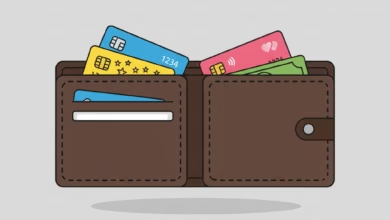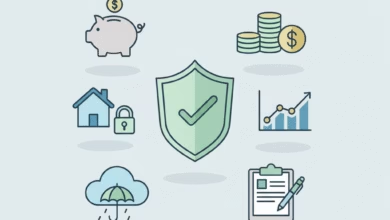When it is NOT worth taking out a loan
Understand when you should or should not apply for a loan

Loans can be powerful financial tools, helping us achieve significant goals like buying a home or funding an education. However, not every situation calls for borrowing. In fact, there are many times when taking on debt can do more harm than good, trapping you in a cycle of payments that outweigh any initial benefit. Understanding these scenarios is crucial for maintaining a healthy financial life. This article will highlight critical situations when getting a loan is simply NOT worth it.
The High Cost of Unnecessary Debt: Understanding the Downside of Loans

Before diving into specific “no-loan” scenarios, it’s vital to grasp why taking on unnecessary debt is detrimental:
- Interest Payments: Every loan comes with interest, meaning you pay back more than you borrowed. Over time, this can add up to a significant sum.
- Impact on Credit Score: While timely payments can boost your score, missing payments or taking on too much debt can severely damage it.
- Financial Stress: Loan payments add a fixed expense to your budget, reducing your financial flexibility and potentially increasing stress.
- Opportunity Cost: Money spent on loan interest could have been saved, invested, or used for other wealth-building activities.
When Your Loan Purpose is a “Want,” Not a “Need”: Avoiding Debt for Luxuries
One of the most common reasons people regret taking out a loan is borrowing for non-essential items or experiences.
- Vacations and Travel: While tempting, financing a vacation means you’ll be paying for that trip long after the memories fade, often with significant interest.
- Designer Clothes or Gadgets: Impulse purchases of high-end items that quickly depreciate are rarely worth financing. Their value drops quickly, but your debt remains.
- Weddings and Lavish Parties: While special, starting a new life or celebrating a milestone under a mountain of debt can put immense strain on your future.
- Unnecessary Vehicle Upgrades: If your current car is functional, taking a loan for a newer, more expensive model just for status or minor improvements often isn’t financially sound.
For these items, saving up in advance is almost always the better financial strategy.
When You Lack a Clear Repayment Plan: The Recipe for Financial Trouble

Taking a loan without a clear, realistic strategy for repayment is akin to driving without a map. It’s a direct path to financial distress.
- Relying on Future Income: Expecting a raise, a bonus, or a new job to cover payments is risky if those income boosts aren’t guaranteed.
- Not Adjusting Your Budget: If you haven’t reviewed your current expenses and identified how the new loan payment will fit into your budget, you’re heading for trouble.
- Borrowing to Pay Other Debts (Without a Strategy): While debt consolidation can be beneficial, simply taking out a new loan to pay old ones without addressing the root cause of your debt problem is a “debt shuffle” that rarely works.
A solid repayment plan, backed by a realistic budget, is non-negotiable for any loan.
When Your Income is Unstable or Insufficient: The Risk of Default
Lenders assess your income stability for a reason. If your income is unreliable or too low to comfortably cover payments, a loan is a huge gamble.
- Gig Economy with Fluctuating Income: If your income varies significantly month-to-month, committing to a fixed loan payment can be extremely stressful and lead to missed payments.
- Part-Time or Low-Paying Job: If your current earnings barely cover your existing expenses, adding a loan payment will likely push you into a deficit.
- Anticipating Job Loss or Reduced Hours: If you foresee a decrease in income, taking on new debt is ill-advised.
In these situations, focus on stabilizing your income and building an emergency fund before considering a loan.
When the Interest Rate is Excessively High: Avoiding Predatory Lending

Not all loans are created equal. Some come with interest rates that are simply too high, making them incredibly expensive and difficult to repay.
- Payday Loans: These short-term loans often have Annual Percentage Rates (APRs) of 300% or more, trapping borrowers in a cycle of debt.
- Title Loans: Similar to payday loans, these use your car title as collateral and come with exorbitant rates.
- Subprime Personal Loans: If your credit score is very low, you might be offered loans with extremely high interest rates that make repayment almost impossible.
- Hidden Fees and Charges: An attractive interest rate can be deceiving if there are numerous hidden fees that inflate the true cost (which is why comparing APRs is essential).
Always compare rates, understand the APR, and if a rate seems too good to be true (or too bad to be true!), it probably is.
When It’s for an Expense That Can Be Saved For: The Power of Patience
Many expenses that people consider loans for can, and should, be saved for instead. This avoids interest payments entirely.
- Small Home Repairs: Unless it’s an emergency like a burst pipe, minor renovations or repairs can often be funded from savings.
- Appliance Replacement: If your old appliance is still working, start saving for its eventual replacement rather than borrowing.
- Car Maintenance: Regular car maintenance or minor repairs should ideally come from an emergency fund or dedicated savings.
- Holiday Shopping: Accumulating credit card debt for holiday gifts is a classic financial mistake. Save throughout the year instead.
Patience and a disciplined savings plan are often your best financial allies.
When You Already Have Significant Debt: Don’t Dig a Deeper Hole
If you’re already struggling with existing debt, taking on more can accelerate your financial downfall.
- High Debt-to-Income Ratio: If your current debt payments consume a large portion of your income, adding more will make your situation unmanageable.
- Struggling to Make Minimum Payments: If you’re already finding it hard to meet minimum payments on existing credit cards or loans, new debt is a recipe for disaster.
- Consolidating Debt Without Addressing Spending Habits: Taking out a new loan to pay off old ones (debt consolidation) is only effective if you also change the spending habits that led to the original debt. Otherwise, you’ll just accumulate more debt.
Focus on reducing existing debt and improving your financial habits before considering any new borrowing.
Final Thoughts: Prioritize Financial Health Over Instant Gratification

The decision to take out a loan should never be made lightly or impulsively. By recognizing these critical situations where borrowing isn’t worth it, you can make smarter financial choices that protect your future. Prioritize building an emergency fund, living within your means, and saving for your goals. Sometimes, the best loan is the one you don’t take.





